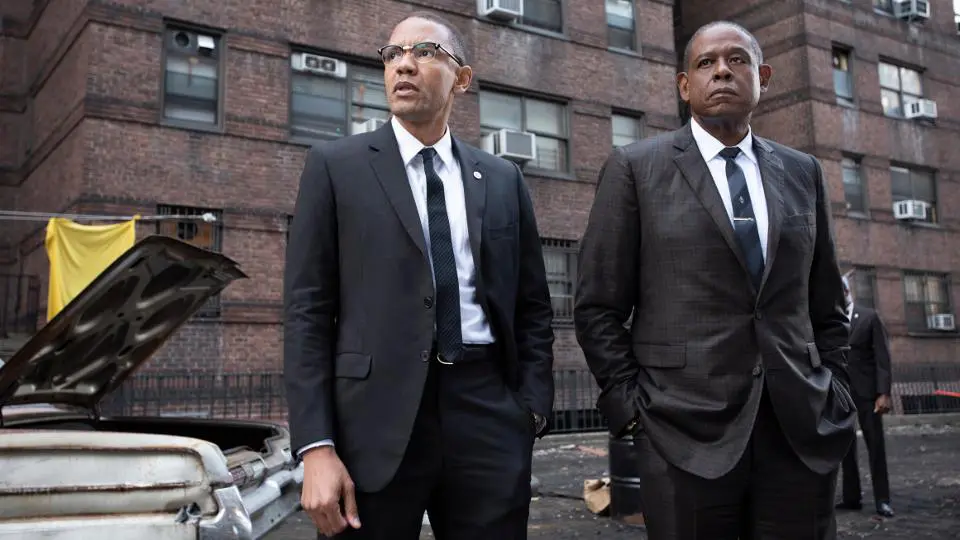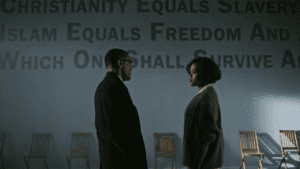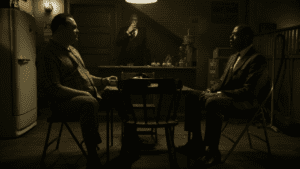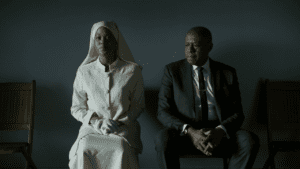Summary
Epix’s new crime drama boasts a fantastic cast and an intriguing blend of gangland theatrics and period radicalism.
This recap of the Godfather of Harlem (Epix) Season 1 Premiere contains spoilers.
It’s the cast, I think, that elevates Epix’s new crime drama, based on the exploits of real-life heroin peddler Ellsworth “Bumpy” Johnson, into something that is likely to become a major hit. Forest Whitaker plays Bumpy, fresh from an 11-year stretch in Alcatraz, returning to a Harlem he scarcely recognizes. Nigel Thatch, reprising his role from Ava DuVernay’s Selma, plays revolutionary Muslim minister Malcolm X. Giancarlo Esposito is silver-tongued Baptist pastor Adam Clayton Powell Jr., and Vincent D’Onofrio is flagrantly racist Italian heavy Vincent Gigante. Most of the Godfather of Harlem Season 1 premiere was spent watching these fine actors dual in the glare of headlights amongst dilapidated project towers, where the heroin they’re fighting over is wreaking havoc among the already downtrodden populace. Whenever the show talks, you can’t help but listen.
And it’s talking about more than your average Mob melodrama, though there’s plenty of room for that kind of thing too. But the early-60s setting isn’t just for show. It crams real people into real places from Harlem history and has them exchange civil rights rhetoric with measured intensity. These actors only play one character each, but all embody many roles. Whitaker, as the lead, has the most difficult job, having to balance menace with repressed trauma and guilt over his own product ravaging the streets he unashamedly cherishes — and the people he considers himself one of. He’s a loving husband to his wife, Mayme (Ilfenesh Hadera), and a devoted father, but also a hardened criminal who isn’t above taking a razor to a made man for trying to have him killed.

In Bumpy’s absence, Harlem has been taken over by Italian crime families, of which Gigante is a proud member. Much of the Godfather of Harlem premiere is taken up with the escalation of his rivalry with Bumpy, and a subplot in which his wayward daughter Stella (Lucy Fry) absconds with a black musician and a pack of heroin. The show has odd elements like this, and a towering torturer nicknamed Big Dick Buster (Hank Strong), who rapes information out of male captives, which feel like transplants from a different show. Sometimes that wavering of tone can be a bit distracting. But it’s all held together by the tightly reined-in performances and the expensively-rendered period aesthetic, and I suppose the ballsiness of having 60s radicalism be more than just subtext in what is otherwise a genre piece aimed quite squarely at genre fans.
There’s something about all this jumbled-up historical-fiction that I really admired. I like the feeling of genuine surprise that comes from an unexpected deviation or a fresh twist on an old idea. I like the knowing sense of admiration that she show seems to have for the real-life figures it recreates, such as when a humble shoeshine man comments on how great it is just to watch Malcolm X and Adam Clayton Powell argue in the street. And I like that the nostalgia isn’t just limited to place and time, but also the show’s formal influences, including its namesake, which gets some explicit nods of homage here and there that are a pleasure to spot. Godfather of Harlem might not be as revolutionary as its subject matter, but its a very good version of exactly what it wants to be. And sometimes that’s quite enough.




